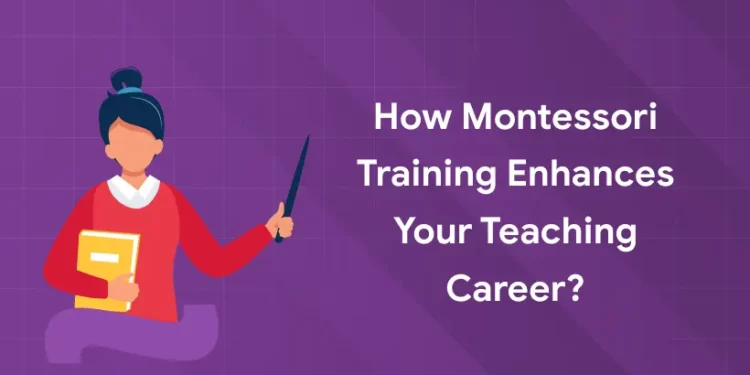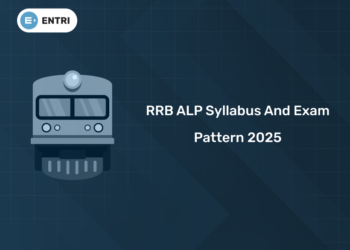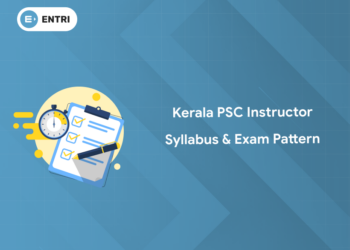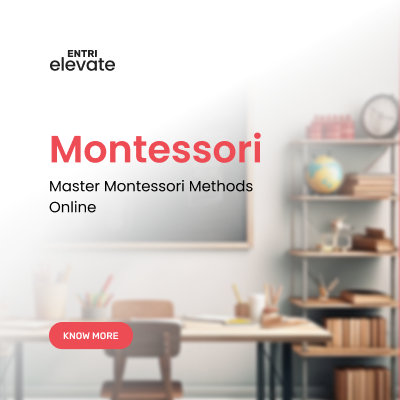Table of Contents
The Montessori method of learning gained popularity among present-day parents due to the child-led learning strategies they use. This method is vastly different from the traditional teaching methods. So, it is only natural to assume that the training required for Montessori instructors is also unique. You must have heard about Montessori teacher’s training courses. Such a course aims to equip future Montessori educators with the theoretical as well as practical knowledge required for implementing this strategy in classrooms. But do you know how this course is different from traditional teachers training education? How Montessori training enhances your teaching career? Let us find out.
Learn Montessori principles from the best mentors in the field! Click here to register now!
How Montessori Training Enhances Your Teaching Career: Introduction
This method of education was first introduced by Italian doctor and teacher Maria Montessori. This method at the time was innovative and showed that child-centred education is possible. This learning method does not restrict itself to academics. It helps the child develop qualities like critical thinking, practical life skills and independence. It fosters a love for learning in the child. Children are encouraged to directly interact with their environment and develop skills like maths, science and culture. It is more useful for a child’s holistic education which cannot be gained in the confines of four walls. This is why the Montessori method is respected around the world.
It can be very helpful to take a teaching course in Montessori education if you have a strong desire to work with young students and are considering implementing this method.
Since the principles and working of Montessori schools are so different from the standard models of education, it is to be expected that the teacher’s training required to be a Montessori educator might also be different. And it is so! There is so much to learn if you want to become a Montessori educator. You might be wondering if attending a Montessori training is beneficial. How Montessori Training Enhances Your Teaching Career? Let us find out!
Join the Entri Elevate Montessori teacher training course to learn and get placement assistance!
Understanding the Core Principles of Montessori Education
1: What is the primary focus of the first plane of development in the Montessori method?
The Montessori approach is a teaching methodology that is used to educate children. This self-directed approach to education, which was created in 1907 by Italian physician Dr. Maria Montessori, helps kids grow up to be independent and self-assured. Understanding the universal traits of human tendencies aided Montessori in creating a systematic educational approach that addresses all facets of a child’s development. The three primary facets of learning that the Montessori method emphasizes are studies, formal skills, practical skills, and sensory skills.
Structured, methodical, and child-centred is the hallmark of the Montessori teaching approach. It allows students to study at their own pace. The following principles form the foundation of the Montessori teaching methodology. Without Knowing these, you cannot understand “How Montessori Training Enhances Your Teaching Career”.
The Absorbent Mind Principle
The first six years of a child’s life are critical for growth and development, according to Dr. Montessori. A child’s mind is absorbent and open to sensory stimulation during the first six years of life. At this age, the child is likely to take in information from their environment. It is crucial to concentrate on stimuli that promote the child’s knowledge and understanding of the world, culture, and knowledge.
The Principle of Respecting Children
It’s critical to take into account each child’s individual needs and preferences. The instructor should serve as a mentor, giving kids the right setting and resources to help them realize their full potential. Throughout the teaching process, the instructor should treat the students with respect.
Individual Development Principle
Each child has distinct abilities and ways of expressing their inner potential. Montessori schools are aware of this and offer customized curricula and learning activities so that kids can progress at their own pace.
The Intrinsic Rewarding and Non-Punishing System Principle
Maria Montessori was a strong proponent of experiential learning. She believes that learning shouldn’t be forced through rewards or penalties. The child should have an innate desire to work independently.
Sensitive Period Principle
The child goes through distinct phases as they develop, according to Dr. Montessori. The child may exhibit extreme focus, dedication, concentration, and repetition during these developmental phases. At certain developmental stages, the child is more likely to acquire particular knowledge and abilities. Sensitive Periods were the names given to these periods of extreme focus and concentration.
The Autolearning Principle
According to Dr. Montessori, children are capable of learning on their own. When students are allowed to study and work independently, auto-education is put into practice.
The Prepared Environment Principle
Children can engage in activities of their choosing in the prepared setting of a Montessori classroom. The Montessori classroom’s prepared environment gives the kids new and exciting experiences as well as materials for activities. Throughout the learning process, the classroom’s prepared environment fosters a sense of structure and order.
The Sensory Training Principle
It states that it is critical for young children to learn through their senses. Maria Montessori asserts that sensory training is crucial to the educational process. Giving students the chance to feel, see, hear, touch, smell, and taste improves their learning.
The Motor Training Principle
According to Maria Montessori, a child’s education should include both fine and gross motor exercises. The curriculum includes numerous kinesthetics, exercises, and physical activities that promote muscle growth and enhance muscle memory.
Development from Within Principle
The natural curiosity of the children in Montessori schools serves as the foundation for their education. Children should be given the right environment and resources at school to help them realize their full potential.
The Children’s House Concept
Maria Montessori termed schools for young children “children’s houses.” The children’s house activities centre on the child’s overall development. Maria Montessori created her materials by incorporating some concepts from Froebel and Seguin’s Kindergarten movement. The Children’s House concept emphasizes social values, physical activities, and basic manners.
The Teacher’s Role
In a Montessori school, teachers serve as directors or guides for the student’s education. As a facilitator, the teacher should always be prepared to offer the kids the assistance they need. The various ways in which a teacher should assist her students are listed below.
| Role of the Teacher | Description |
| Guidance | A teacher should care for the student in the same way that a gardener tends to plants. The teacher should give the students the freedom to develop and learn on their own while also giving them the right direction and guidance to help them advance. |
| Observation | The instructor should keep an eye on the student’s development and behavior. Every student in the class should be well-known to the teacher.
She should keep track of each child’s weight, height, and other measurements as well as their individual development. |
| Providing | A suitable setting for the educational process should be provided by the teacher. It is her duty to provide her students with the tools and resources they need to receive an education. |
| Encouragement | The instructor ought to motivate the students to venture beyond their comfort zone. It is the teacher’s responsibility to give the child freedom of choice and a prepared environment. |
How Montessori Training Enhances Your Teaching Career? Talk with an expert to clear career doubts!
Hands-on Learning
Concrete, sensory experiences are prioritized over abstract ideas in Montessori education. Youngsters learn by doing, working with materials, and using their senses to interact with their surroundings. Deeper comprehension, problem-solving abilities, and a passion for exploration are all fostered by this practical approach.
Montessori classrooms are furnished with specially made manipulative materials that encourage children to solve problems and learn by touch. Similar to this, abstract ideas are made more relatable and understandable by using manipulatives and real-world examples. Active exploration comes next. Here, kids are encouraged to try new things, ask questions, and gain firsthand knowledge.
Freedom within Boundaries
Instead of chaos, true freedom in a Montessori setting is the ability to explore and learn within predetermined boundaries. This gives kids the ability to make decisions, accept accountability for their actions, and cultivate self-control. Children can flourish in predictable environments when there are clear rules and routines in place, which give them a sense of security and structure. Children also gain an understanding of cause-and-effect relationships and accountability by learning from the obvious consequences of their decisions. They also discover that freedom entails fostering empathy and social responsibility as well as respecting the rights and boundaries of others.
Cosmic Education
Montessori education encompasses a comprehensive, interconnected worldview in addition to traditional academic subjects. Geographical, historical, scientific, and artistic ideas are presented to children as interrelated components of a greater whole rather than as separate subjects. As a result, they develop wonder, curiosity, and an appreciation for the world.
By doing this, kids develop their critical thinking and problem-solving abilities while learning about the connections between various subjects. Children are encouraged by the curriculum to look beyond specific facts and take into account the larger context of their education. A sense of global citizenship and responsibility is fostered by an understanding of one’s place in the world and the interconnectedness of everything.
Mixed-Age Groups
Children of various ages learn together in Montessori classrooms, which are usually multi-age groups. As a result, a special learning environment is created in which older children gain leadership and mentoring skills while younger ones learn from them through imitation and observation. In this setting, younger kids learn by watching and interacting with older kids, which speeds up their growth. Another benefit of mixed-age groups is that they give kids the chance to practice empathy, cooperation, and conflict resolution. It is also evident that by mentoring and helping younger kids, the older kids develop their self-esteem and leadership abilities.
Peace Education
Peace and conflict resolution are highly valued in Montessori education. Youngsters learn to respect others’ differences, settle disputes amicably, and express their emotions in a healthy way. Here, kids learn how to respectfully communicate their needs and emotions without using violence. This creates a more tranquil and harmonious learning environment in the classroom and gives kids useful life skills. Understanding of various viewpoints and cultures is fostered by activities and conversations conducted in a Montessori environment. Youngsters also learn how to compromise and negotiate.
Play Is Work
The child expresses himself through play, so the teachers should take it very seriously. Maria Montessori thought that the best way to learn was through play and that children’s innate curiosity should be supported with the right materials.
Get Certified & Start Your Montessori Career
Montessori Teacher Training Course by Entri App: Gain expert skills, earn certification, and kickstart your teaching career.
Join Now!Key Skills Achieved Through Montessori Training
A Montessori teacher training course aims to provide the enrolled student with the knowledge and skills essential to implement the Montessori method of learning in an allotted classroom. In the old days, this course was inaccessible to many people. But the digital revolution and the internet have brought this program to our fingertips. Now Montessori teacher’s training is much more accessible with many formats of classes. This includes online options, hybrid formats, and conventional teacher training courses. Core elements usually consist of the following.
Knowledge of Child Development
It is crucial to have a thorough understanding of how children develop physically, socially, emotionally, and cognitively at various stages. This knowledge aids teachers in designing spaces that meet the needs of each student’s personal development.
Principles and Philosophy of Montessori
The Montessori philosophy, which emphasizes the teacher’s role as a facilitator rather than a traditional instructor, is emphasized in training programs. Teachers are taught the value of establishing a ready-made environment that encourages self-directed learning.
Planning and Implementation of the Curriculum
Teachers receive training on how to create a school curriculum that adheres to Montessori principles. Developing interesting, developmentally appropriate learning activities that are suited to the interests and requirements of every child is part of this.
Classroom Management
Sustaining a calm and organized learning environment requires effective classroom management. Training courses emphasize methods for promoting constructive social interactions and successfully controlling behaviour.
Evaluation and Assessment
Teachers acquire a variety of assessment techniques to track and record students’ progress.This also includes using formative assessments for directing the instruction and fostering the holistic development of students.
Cooperation and Good Communication
The main goal of the Montessori strategy itself is to build strong connections with the staff members, parents as well as the community. Montessori learning places a strong emphasis on teamwork and efficient communication. This led to the maintenance of a positive and cheerful atmosphere.
Get the best PDF learning materials for the Montessori method principles! Join Entri now!
How Montessori Training Enhances Your Teaching Career?
Joining in Montessori teacher training is necessary for a rewarding and sustainable career as a Montessori school teacher. However, what specific skill sets does Montessori training for teachers offer that can aid you in the classroom? The following paragraphs will go over the numerous ways that Montessori training prepares you for an exciting career in early childhood education. Hopefully, that is sufficient to answer your question” How does Montessori training enhance your teaching career?”.
Good Understanding of Child Development
A thorough understanding of child development is one of the pillars of Montessori teacher preparation. The foundation of the Montessori method is that the children are naturally capable and curious learners. They pass through various developmental phases. The Montessori teacher’s training courses give a future educator proper knowledge of the developmental psychology of children. This helps them in identifying emotional, social and intellectual milestones a child would reach at certain ages.
As a Montessori teacher, you have to meet your students at their level. Then you have to modify the learning process in such a way that it supports the individual growth trajectory of the said child. The Montessori training gives an educator the ability to respect a child’s developmental stages. At the same time, it arms an instructor with skills needed to encourage the child’s independence, curiosity, and confidence. Do you want to develop a supportive learning environment and give engaging lessons in the classroom? Pay special attention to child developmental theories during your Montessori teacher training.
Practical Training
Montessori teacher’s training consists of both theory and practical, unlike the traditional teachers’ training modules which give more emphasis to lectures and textbooks (even though there are practical lessons). This means, that Montessori education prioritises experiential learning. A Montessori teacher training student undergoes hands-on experience working with Montessori materials. Therefore, they have a deeper understanding of how they affect the cognitive and sensory development of a child.
There is a practice Montessori classroom where you will spend much of your time during training. Here you will interact with children learn how to work with Montessori material and lead the children through learning activities. This experiential learning gives you the skills to create exciting and effective lessons that are customised to meet the unique needs of each child. Once the Montessori training is over, you will be able to design a lively and engaging learning environment for your students.
Focus on Observation and Reflection
Observation is a crucial component of the teaching process in Montessori education. Montessori educators are taught to pay close attention to each child, seeking out hints about their needs, interests, and developmental stages. Montessori teachers observe and listen to the children’s activities rather than just giving instructions, and intervening when needed to extend or guide learning.
This emphasis on observation makes Montessori teachers more sensitive to the needs and learning preferences of each child. Additionally, it enables educators to modify the curriculum, learning environment, and resources in response to the development and interests of each student. Montessori teacher’s training gives importance to observing children and then reflecting on their interactions. In this way, a Montessori teacher can bring necessary changes to their strategy and teaching practice to meet the unique needs of each child. The emphasis Montessori teacher’s training gives to observation and reflection makes sure that you will make adaptive and thoughtful decisions. This in turn guarantees that each child will get the time and assistance they need to excel.
Fostering Social-Emotional Development
Montessori teacher training gives importance to promoting the social and emotional development of children along with their academic progress. The child will learn to cooperate with others, control their emotions and resolve conflicts because of this speciality of the Montessori method. During training, the educator has to learn to do the following things.
- resolve conflicts between children
- model emotional intelligence
- foster empathy for other
- foster respect for classmates
If an educator wants to cultivate a nurturing, welcoming and inclusive learning environment in their classroom, then they have to learn these skills. A child is more likely to willingly participate in the learning process and develop social skills if they feel that they are understood. Emotional support is a very essential thing a Montessori educator has to impart to their students. The foundations of emotional intelligence are where you will build the groundwork for love for learning and well-being.
Boosting Independence and Self-Confidence
The basic idea of Montessori education is child-led learning. This means a child is more likely to participate wholeheartedly in the learning process if they are in charge of their education. A Montessori teacher’s role is to help children develop into self-sufficient learners. They should have the capacity to make choices, take charge and solve issues independently.
The trainees of Montessori teacher training courses are taught to cultivate such autonomy in children. Letting children explore by themselves at their own pace while acting as a guide and providing them with necessary materials and instruments is a part of this. This helps in developing a sense of self-worth and pride in children. This can be done by arranging workstations, preparing activity materials and then helping the child select the activities that pique their interest. Children are better prepared for success in school and life when they are given the freedom to direct their education. Children who attend a Montessori classroom develop self-confidence that lasts long even after they are no longer under your guidance.
A Variety of Career Opportunities
Numerous career options in early childhood education are made possible by Montessori teacher training. With more Montessori schools and programs opening up every year, there is a growing demand for educators with training in the method worldwide. Once your Montessori certification is complete, you can work in a variety of environments, such as the ones in the following table.
| Job | Description |
| Private Montessori Schools | Many Montessori teachers are employed by private schools, where they have the opportunity to influence the curriculum and school culture. |
| Homeschooling | Working as a homeschool educator and establishing a Montessori-inspired educational environment for your children or others is an option if you have received Montessori training. |
| Montessori Advocacy and Consulting | A Montessori consultant’s job is to provide necessary advice and assistance to institutions that wishes to change their teaching process into Montessori method. But you have to be well knowledgeable and have years of experience to do this job. |
Montessori community provides a wide range of careers for aspiring students. So, a Montessori trained teacher definitely will have the chances to go to careers that fit their values, talents and interests.
Improved Instructional Skills
Enrolling in a Montessori teacher’s training course will help you gain a deeper understanding of Montessori working principles. Here you will learn various strategies for doing the following things:
- Involving children in more meaningful learning activities
- Attend to the specific needs of each child
- Encourage self-directed learning and autonomy
The training will help you develop better teaching skills. This in turn will help you become well-equipped to provide an encouraging learning environment to your students.
Professional Recognition and Accreditation
Accreditation and recognition are essential for any academic field. Montessori education is no different. Achieving a Montessori teacher training certification from a recognised institute will help you attain all these things. Montessori schools and organisation prefers to employ educators who have learned from institutions with proper accreditations. This is because accreditation guarantees the quality of instruction they receive and hence their quality as teachers. If you learn a Montessori teacher training course from a proper platform with legit accreditations, you have more chances of landing a better job.
Improving Classroom Management Skills
Effective classroom management techniques, such as how to keep the classroom calm and orderly, control student behaviour, and cultivate good relationships with parents and coworkers, are taught in Montessori training programs.
Designing Prepared Environments
Creating ready-made spaces that encourage self-directed learning, and exploration is a fundamental component of Montessori education. Montessori teacher’s training will help one set up a learning environment with materials that promote the intellectual, motor and sensory development of children. Without the right training, teachers often fail in setting such an environment and hence optimize learning.
Implementing Personalized Learning Plans.
All children are unique. They have their preferences, style and speed of learning. In Montessori teachers training a trainee learns how to create customised learning plans that will provide the right guidance and tools that suits a child’s unique needs. An educator becomes an expert in modifying tools and activities in such a way that it assists each child and promotes their holistic development.
Development on Both a Personal and Professional Level
Completing a Montessori teachers training course will aid in both personal and professional development in addition to acquiring new skills. The curriculum of the course promotes things like self-analysis, introspection and growth. This course will give you a chance to participate in important conversations, reflecting on your teaching methods and working with peers. All of these will help you gain a better understanding of how a student reacts to various teaching methods.
Several levels of Montessori teacher’s training programs are available now. Some are for beginners. But some are more complex and specialized. They are available in a variety of formats too in various durations. All you have to do is select a course that suits your career aspirations, budget and schedule. But what will you choose? Have you thought about joining the Entri Elevate Montessori training program? They offer a holistic course with expert faculty, live and recorded sessions and a certificate/ diploma recognised by many institutions like CEED International, American Association of Teachers & Trainers and FICS (Forum for International Certified Scholars).
The Entri Elevate Montessori Teacher training curriculum consists of the following sections.
- Literacy Development
- Effective Communication
- Creative Learning
- Observation
- Research Skills
- Positive Discipline
Click here to get more information about the Entri Elevate Montessori training course! Join now
How Montessori Training Enhances Your Teaching Career: Conclusion
Are you still wondering “How Montessori Training Enhances Your Teaching Career” after reading the above section? There is no need to overthink the authenticity of the advantages of the Montessori teacher’s training courses. This course offers an all-inclusive understanding of Montessori philosophy, betters your teaching skills as well as offer required certification that boosts your chance of landing a well-paid job, that too in a reputable educational institution. It endorses both your professional as well as personal progress. By getting trained as a Montessori instructor, you are becoming part of a global network of educationalists whose aim is to provide holistic education to youngsters. So, if you are a passionate proponent of the Montessori method, then enrolling in a Montessori teacher training course and gaining a certificate is the first step to achieving your vast professional ambitions.
Get Certified & Start Your Montessori Career
Montessori Teacher Training Course by Entri App: Gain expert skills, earn certification, and kickstart your teaching career.
Join Now!Frequently Asked Questions
What is the best part of the Montessori Method?
Making a long-lasting difference in children’s lives is arguably the most fulfilling part of training to become a Montessori teacher. Montessori teachers help children acquire the abilities, self-assurance, and independence necessary to succeed in the world by fostering a lifelong love of learning in addition to teaching academic subjects. The connections you make with your students will last a lifetime, and many Montessori graduates come back to express gratitude to their teachers for the support and direction they received.
Does the Entri Elevate Montessori Teacher Training Course require any prior teaching experience?
No, prior teaching experience is not a prerequisite for enrollment in the Entri Elevate Montessori TTC.
After completing the Entri Elevate Montessori Teacher Training Course, can I work as a Montessori teacher?
Indeed. Qualified candidates can work as Montessori teachers after completing the Entri Elevate Montessori TTC because the course certificates are accredited.
Which Montessori toys are the best?
Some common “official” Montessori toys are used in Montessori schools, such as the pink tower, cylinder blocks, broad staircase, etc. Typically, these are called “Montessori materials.” Apart from that, a large selection of toys that adhere to the Montessori principles are available.
Does Entri Montessori TTC offer a globally recognized certificate?
Indeed. CEED INTERNATIONAL, USA Certification, and UK Certification grant you a globally recognized certification.
Are Montessori schools superior to regular ones?
There may be differences in quality between Montessori and other school types, so we shouldn’t draw hasty conclusions about which is superior. However, several studies indicate that children who attend Montessori schools are more likely to develop academically, socially, and emotionally.
Is it possible to practice the Montessori method at home?
The Montessori approach can be thought of as a way of life rather than merely a collection of particular exercises that are taught in schools. As a result, parents can start promoting it in their homes at a young age.
What are the benefits of taking a Montessori teacher’s training course?
A Montessori teacher training course is essential for teachers who want to effectively use this successful teaching method. These programs give teachers the tools they need to design engaging and productive learning environments. This is done by emphasizing skills like curriculum planning, classroom management, assessment, communication, child development, and Montessori philosophy knowledge.
When is the ideal age to begin Montessori?
Children ages 0 to 6 are covered by the Montessori concept of an absorbent mind, which describes a period of “sponge-like” learning in young children. Thus, parents can adopt the Montessori principles from birth. Typically, Montessori preschool programs begin when a child is three years old.










